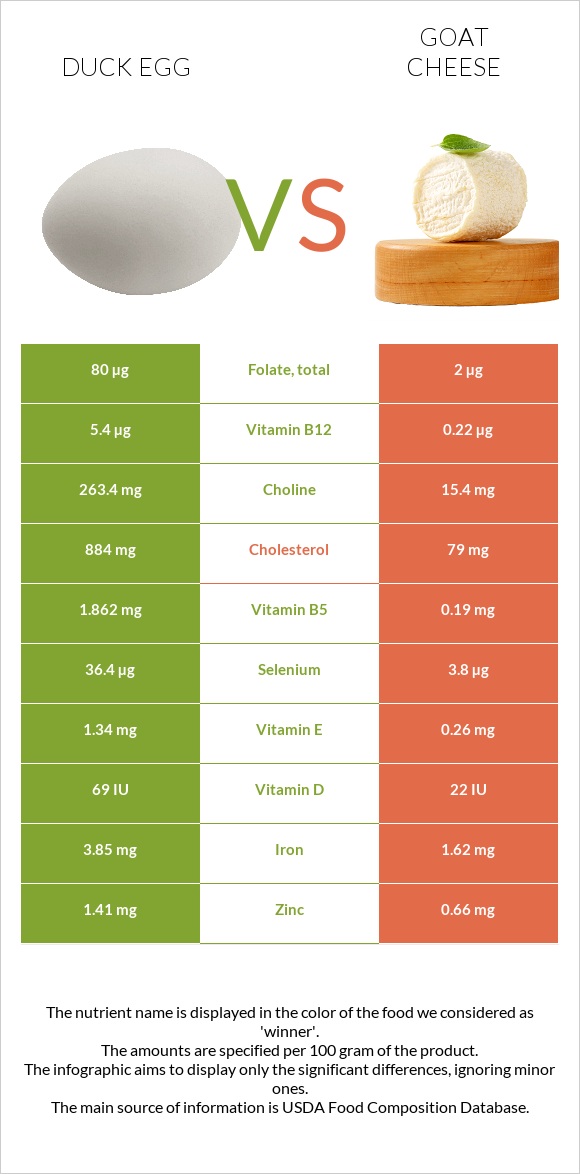Duck egg vs. Goat cheese — In-Depth Nutrition Comparison
Compare
A recap on the differences between duck eggs and goat cheese
- Duck eggs are higher in vitamin B12, selenium, choline, vitamin B5, and iron, yet goat cheese is higher in copper, calcium, and phosphorus.
- Duck eggs cover your daily cholesterol needs 268% more than goat cheese.
- Duck eggs contain 25 times more vitamin B12 than goat cheese. While duck eggs contain 5.4µg of vitamin B12, goat cheese contains only 0.22µg.
- The amount of cholesterol in goat cheese is lower.
Food varieties used in this article are Egg, duck, whole, fresh, raw and Cheese, goat, semisoft type.
Infographic

Infographic link
Mineral Comparison
Mineral comparison score is based on the number of minerals by which one or the other food is richer. The "coverage" charts below show how much of the daily needs can be covered by 300 grams of the food.
| Contains more PotassiumPotassium | +40.5% |
| Contains more IronIron | +137.7% |
| Contains more ZincZinc | +113.6% |
| Contains less SodiumSodium | -64.8% |
| Contains more SeleniumSelenium | +857.9% |
| Contains more MagnesiumMagnesium | +70.6% |
| Contains more CalciumCalcium | +365.6% |
| Contains more CopperCopper | +809.7% |
| Contains more PhosphorusPhosphorus | +70.5% |
| Contains more ManganeseManganese | +144.7% |
Vitamin Comparison
Vitamin comparison score is based on the number of vitamins by which one or the other food is richer. The "coverage" charts below show how much of the daily needs can be covered by 300 grams of the food.
| Contains more Vitamin EVitamin E | +415.4% |
| Contains more Vitamin DVitamin D | +240% |
| Contains more Vitamin B1Vitamin B1 | +116.7% |
| Contains more Vitamin B5Vitamin B5 | +880% |
| Contains more Vitamin B6Vitamin B6 | +316.7% |
| Contains more Vitamin B12Vitamin B12 | +2354.5% |
| Contains more FolateFolate | +3900% |
| Contains more Vitamin AVitamin A | +109.8% |
| Contains more Vitamin B2Vitamin B2 | +67.3% |
| Contains more Vitamin B3Vitamin B3 | +474% |
| Contains more Vitamin KVitamin K | +525% |
All nutrients comparison - raw data values
| Nutrient |  |
 |
DV% diff. |
| Cholesterol | 884mg | 79mg | 268% |
| Vitamin B12 | 5.4µg | 0.22µg | 216% |
| Saturated fat | 3.681g | 20.639g | 77% |
| Selenium | 36.4µg | 3.8µg | 59% |
| Copper | 0.062mg | 0.564mg | 56% |
| Choline | 263.4mg | 15.4mg | 45% |
| Vitamin B5 | 1.862mg | 0.19mg | 33% |
| Iron | 3.85mg | 1.62mg | 28% |
| Fats | 13.77g | 29.84g | 25% |
| Vitamin A | 194µg | 407µg | 24% |
| Calcium | 64mg | 298mg | 23% |
| Phosphorus | 220mg | 375mg | 22% |
| Vitamin B2 | 0.404mg | 0.676mg | 21% |
| Folate | 80µg | 2µg | 20% |
| Protein | 12.81g | 21.58g | 18% |
| Vitamin B6 | 0.25mg | 0.06mg | 15% |
| Sodium | 146mg | 415mg | 12% |
| Calories | 185kcal | 364kcal | 9% |
| Zinc | 1.41mg | 0.66mg | 7% |
| Vitamin E | 1.34mg | 0.26mg | 7% |
| Vitamin B1 | 0.156mg | 0.072mg | 7% |
| Vitamin D | 69 IU | 22 IU | 6% |
| Vitamin D | 1.7µg | 0.5µg | 6% |
| Vitamin B3 | 0.2mg | 1.148mg | 6% |
| Magnesium | 17mg | 29mg | 3% |
| Polyunsaturated fat | 1.223g | 0.709g | 3% |
| Potassium | 222mg | 158mg | 2% |
| Manganese | 0.038mg | 0.093mg | 2% |
| Vitamin K | 0.4µg | 2.5µg | 2% |
| Monounsaturated fat | 6.525g | 6.808g | 1% |
| Net carbs | 1.45g | 0.12g | N/A |
| Carbs | 1.45g | 0.12g | 0% |
| Sugar | 0.93g | 0.12g | N/A |
| Tryptophan | 0.26mg | 0.227mg | 0% |
| Threonine | 0.736mg | 0.805mg | 0% |
| Isoleucine | 0.598mg | 0.893mg | 0% |
| Leucine | 1.097mg | 1.861mg | 0% |
| Lysine | 0.951mg | 1.549mg | 0% |
| Methionine | 0.576mg | 0.575mg | 0% |
| Phenylalanine | 0.84mg | 0.859mg | 0% |
| Valine | 0.885mg | 1.485mg | 0% |
| Histidine | 0.32mg | 0.589mg | 0% |
Macronutrient Comparison
Macronutrient breakdown side-by-side comparison
Protein:
12.81 g
Fats:
13.77 g
Carbs:
1.45 g
Water:
70.83 g
Other:
1.14 g
Protein:
21.58 g
Fats:
29.84 g
Carbs:
0.12 g
Water:
45.52 g
Other:
2.94 g
| Contains more CarbsCarbs | +1108.3% |
| Contains more WaterWater | +55.6% |
| Contains more ProteinProtein | +68.5% |
| Contains more FatsFats | +116.7% |
| Contains more OtherOther | +157.9% |
Fat Type Comparison
Fat type breakdown side-by-side comparison
Saturated fat:
Sat. Fat
3.681 g
Monounsaturated fat:
Mono. Fat
6.525 g
Polyunsaturated fat:
Poly. Fat
1.223 g
Saturated fat:
Sat. Fat
20.639 g
Monounsaturated fat:
Mono. Fat
6.808 g
Polyunsaturated fat:
Poly. Fat
0.709 g
| Contains less Sat. FatSaturated fat | -82.2% |
| Contains more Poly. FatPolyunsaturated fat | +72.5% |
~equal in
Monounsaturated fat
~6.808g





